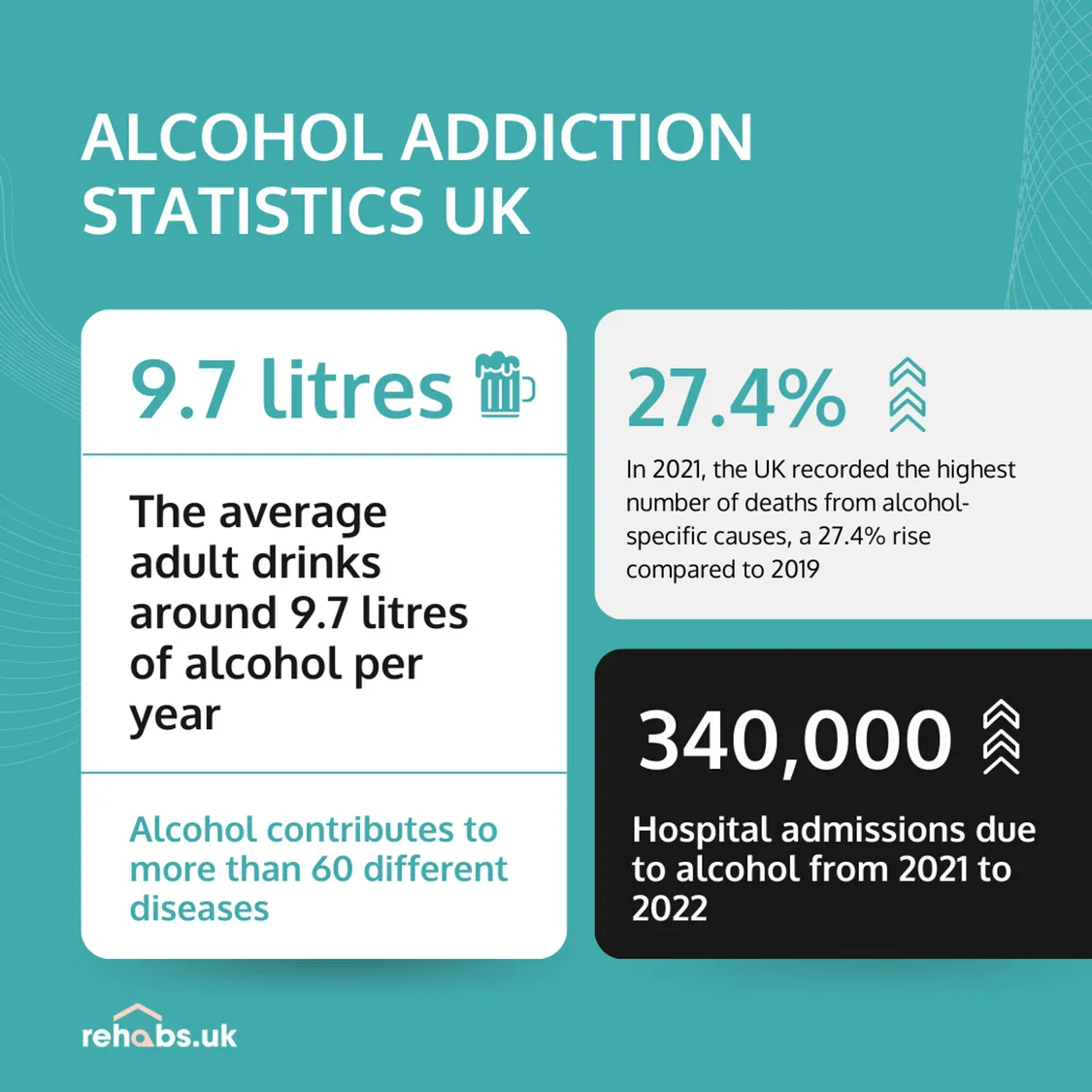01 Aug 2025
Welcome to an in-depth exploration of alcohol addiction statistics in the United Kingdom. In this article, we delve into various aspects of alcohol consumption, its impact on health, the challenges of alcohol dependence, and the available treatment options. All the statistics presented here are sourced from reputable databases and studies to ensure accuracy and reliability.
Alcohol Consumption in the UK
Total Alcohol Consumption
Today, average consumption per adult is about 9.7 litres of pure alcohol per year – or about 18 units a week. There is no reason to think that drinking behaviours are fixed or unchanging. In the UK, where tradition and social life often intertwine, drinking alcohol has become a deeply rooted part of the culture, shaping everything from celebrations to everyday interactions.
- In 2023, there were 8,274 alcohol-specific deaths in England, marking a 4.6% increase from 2022 and a 63.8% rise since 2006. This equates to 15.0 deaths per 100,000 people—the highest rate since records began.
- Most alcohol sold in Scotland during 2024 (76%) came from off-trade outlets such as supermarkets and off-licences. Although overall off-trade sales have decreased since 2017, their share of total alcohol sales has risen from 73% to 76%.
- Additionally, data from the Scottish Health Survey show that the proportion of adults identifying as non-drinkers has grown consistently — from 12% in 2008 to 20% in 2023.
- Alcohol-related deaths are significantly higher in the most deprived areas of Wales.
- An estimated 14% of adults were exposed to alcohol misuse during childhood, and evidence suggests that reducing Adverse Childhood Experiences (ACEs) could lower harmful drinking levels by as much as 35%.
- In 2019, 48% of adults (aged 16+) reported drinking alcohol at least once a week.
- In 2024, an average of 9.0 litres of pure alcohol was sold per adult in Scotland — the equivalent of 17.3 units per person each week.
- Between 2017 and 2024, alcohol sales per adult declined steadily, falling from 10.6 litres to 9.0 litres of pure alcohol per year.
Alcohol-related hospital admissions also remain high:
- In the financial year 2023 to 2024, there were 339,916 alcohol-specific hospital admissions, 280,747 alcohol-related hospital admissions under the narrow definition, and 1,018,986 alcohol-related hospital admissions under the broad definition in England. Indicator definitions are given at the end of this commentary.
Alcohol Addiction
Prevalence and Challenges
- England has an estimated 600,000 alcohol-dependent adults, yet only 18% receive any form of specialist treatment.
- In England there are an estimated 602,391 dependent drinkers. Only 18% are receiving treatment.
- Among all adults, the prevalence of hazardous or harmful weekly alcohol consumption varied with age, with the highest levels recorded for those aged 65-74 (27%) followed by those aged 55-64 (25%).
- In 2024, 2% of adults in Wales were drinking at possible dependent levels, which was about 50,000 adults, based on the country's population of approximately 2.5 million adults.
Normal Drinking Habits
- Most UK adults stay within the Chief Medical Officers’ guideline of no more than 14 units per week, spread over at least three days. However, binge drinking and irregular patterns are common in younger adults.
- According to the NHS, it’s recommended no more than 14 units of alcohol a week, spread across 3 days or more. That's around 6 medium (175ml) glasses of wine, or 6 pints of 4% beer.
- A report by Alcohol Change UK reveals that 1 in 5 people feel pressured by friends to drink—highlighting the growing issue of sober shaming in social settings.
Gender Breakdown
- More men than women were admitted to hospital where the main reason was attributable to alcohol - 65% of the patients were male.
- The number of hospital admissions in 2021 - 2022 wholly due to alcohol in men during this time period was double the figure for women (232,783 and 110,012 respectively).
- 55% of males reported drinking alcohol at least once a week compared to 41% of females.
- 8% of males reported drinking alcohol almost every day compared to 5% of females.
- Around 45% of men and 34% of women in Wales report drinking above the recommended guidelines. Each year, alcohol contributes to approximately 1,500 deaths and causes more than £1 billion worth of harm to society.
- There has been research that shows alcoholism in women is rising.
- One study found alcohol-related visits to the emergency room from 2006 to 2014 increased 70% for women, compared with 58% for men.
Consumption by Age
According to the 2022 Health Survey for England (HSE),
- 81% of adults drank alcohol in the previous year (84% of men, 78% of women).
- 55% of men and 42% of women reported drinking at least once a week.
- 32% of men and 15% of women exceeded the recommended 14 units of alcohol per week.
Higher-risk drinking (measured by AUDIT scores -"audit score" is a term that can refer to a score from a specific questionnaire, most commonly the Alcohol Use Disorders Identification Test (AUDIT). The AUDIT is a 10-question screening tool developed by the World Health Organization to assess the nature and severity of alcohol misuse.):
- Highest in 16–24-year-olds (20%)
- Lowest in adults aged 65+ (6%)
- In England in 2022, the mean number of units consumed by all adults aged over 16 years of age was 13.3
- In Scotland in 2022, the average number of units of alcohol consumed by all adults who drink was 12.6 units, ranging significantly by age from 15.5 units among those aged 16-24 years to 10.2 among those aged 75+
- In 2017, men are more likely to drink than women and those aged 45-64 are the most likely to drink, while those aged 16-24 are the least likely to drink
- Since 2005, teetotalism has increased among those aged 16-44, but has fallen by 5% for those aged 65 and over
- Although 16-24 year olds are less likely to have drunk alcohol in the past week, when they do drink, they are more likely to drink at high levels (2017)
Alcohol statistics by region
A clear socioeconomic divide exists: people in the most deprived areas experience more than double the alcohol-specific death rate compared to those in the least deprived (20.9 vs 9.8 per 100,000).
ONS Alcohol-Specific Deaths, Commons Library Alcohol Statistics 2024 states:
- The North East of England had the highest alcohol-specific death rate at 25.7 per 100,000.
- The East of England had the lowest rate at 11.5 per 100,000.
- In Scotland, the rate was 22.6 per 100,000, while in Wales it stood at 17.7 per 100,000.
- Northern Ireland reported 18.5 per 100,000.
- Highest alcohol consumption: East of England
- Lowest alcohol consumption: Wales
Alcohol and Health
Health Impact Statistics
Alcohol is associated with a wide range of health issues. In 2023:
- There were 10,473 alcohol-specific deaths across the UK, a record high.
- These deaths included liver cirrhosis, alcohol poisoning, and alcohol-related cardiovascular issues.
According to a study in 2023 by researchers from Oxford Population Health and Peking University:
- In a study examining 207 diseases, self-reported alcohol consumption was linked to an increased risk of 61 conditions in men. These included 28 illnesses already recognised by the World Health Organisation as alcohol-related — such as liver cirrhosis, stroke, and various gastrointestinal cancers — as well as 33 conditions not previously classified as alcohol-related, including gout, cataracts, certain fractures, and gastric ulcers.
- Additionally, specific drinking habits — such as daily consumption, heavy binge drinking, and drinking outside of mealtimes — were found to further heighten the risk of certain diseases, particularly liver cirrhosis.
- Alcohol can also inhibit sleep, trigger migraines and has been linked to mental health disorders such as depression.
Impact on the Brain
- Studies consistently show that over 50% of alcohol-dependent individuals experience cognitive impairment. This includes memory problems, reduced attention span, and executive dysfunction.
- Over half of all dependent drinkers are likely to experience alcohol related cognitive impairment.

Alcohol Addiction Treatment
There are various different treatment options for alcohol addiction. These may include:
- Cognitive behavioural therapy
- 12-step programmes
- Residential Rehab
- Outpatient programmes such as alcohol home detox
- Anti-craving medication for alcoholism
- Holistic non 12 step approaches
- Group therapy
Find the Right Support for Alcohol Addiction
In summary, the statistics paint a comprehensive picture of alcohol addiction in the UK. If you or someone you know is struggling, there are effective and proven treatments available. Whether it's detox, rehabilitation, or ongoing support, speaking to a medical professional or an addiction referral service like Rehabs UK is the first step towards recovery.
Remember, the journey to recovery starts with seeking help. Contact Rehabs UK to help guide you through every step.
